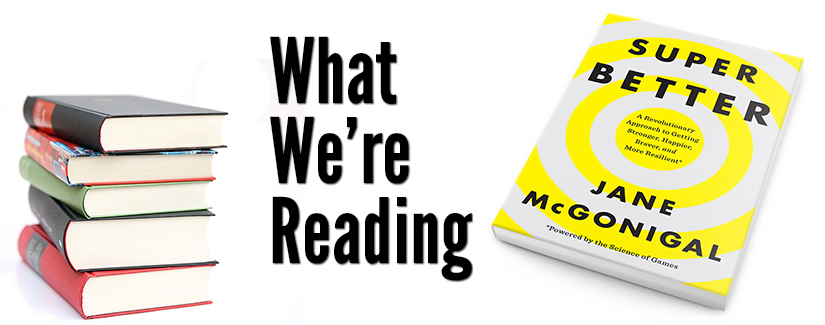
This month, our focus topic is New Year’s Resolutions. Most of us make resolutions to spend more time with family, exercise more, read more, hit new sales goals, or learn a new skill. In reality, these are all versions of the same goal: to be a more complete, happier, and well-rounded human being.
SuperBetter is about accomplishing that goal using the science of games.
Gamification: Level Up!
Games are not just a source of entertainment. They are a model for how to become the best version of ourselves.
What is gamification? It’s reframing real-life situations as games, allowing you to tap into the qualities you use when playing a game to solve the problems and challenges of real life. For example, when you’re playing a board game or video game, chances are you’re brave, resilient, curious, creative, determined, and optimistic. But you may feel shy, anxious, or nervous when presented with a challenge in real life. The theory behind SuperBetter aims to help you bring your gaming self into everyday life.
The author, Jane McGonigal, realized how well gamification could work when she faced the aftermath of a concussion. During recovery, she was depressed, anxious, unable to think clearly, stressed – and suicidal. People kept telling her to “get better,” but in her mind, she wanted to get “super better.” To keep her suicidal thoughts from getting the best of her, she decided to turn her recovery into a role-playing game called SuperBetter, knowing a game would help inspire her to be more creative, determined, and willing to ask for help.
So What Happened?
Whatever your history with games, you have the capacity to tap into your natural strengths by playing games – and you can learn to bring these gameful strengths to your real life challenges and goals.
Within a few days, McGonigal describes feeling transformed. Although the physical symptoms she faced took much longer to heal, using the principles of gamification gave her a sense of control. That sense of control helped banish her depression, anxiety, and suicidal thoughts. Click here to watch her describe this experience in a TED talk about SuperBetter.
When she shared her experience on her blog, readers started copying her methods. Soon, she was hearing from people using gamification to fight cancer, Lou Gehrig’s disease, migraines, broken hearts, and the anxiety caused by years of unemployment. They were all experiencing what scientists call post-traumatic growth, where traumatic events actually help people grow and lead happier, more balanced lives.
What principles did she use to create the game that may have saved her life? Let’s take a look.
SuperBetter: Adding Gamification to Your Life
According to McGonigal, gamification helps you tap into three psychological strengths:
- The ability to control your attention, and by extension your feelings. If you’ve ever tried to pull someone away from a video game they’re immersed in, you’ve experienced this – dedicated players often ignore things like cold or hunger because they’d rather keep playing.
- The ability to find new allies and strengthen existing relationships.
- The ability to strengthen your willpower and determination.
Tapping these strengths, she says, will give you the benefits of post-traumatic growth…without the need to experience a trauma.
The book takes you through dozens of small “quests” designed to help you tap these strengths and improve your physical, mental, emotional, or social resilience. The quests get progressively harder, and by the end, will have taught you seven “gameful” skills you can apply to a real-life challenge:
- 1. Identify your challenge. The game begins when you choose a specific goal or challenge. It has to be something concrete, like “I’m going to recover from this broken leg” or “I’m going to bring in 20 new clients this year.” Undefined goals like “I want to be a better person” aren’t concrete enough to work with.
- 2. Collect “power-ups.” These are small moments or activities that refresh you and give you more energy to face the bad guys. For the author, these were walking around the block, cuddling with her dog, and eating walnuts.
- 3. Find the bad guys. Identify and defeat the obstacles you face in achieving your goals. For the author, these were things that triggered symptoms of pain, depression, or anxiety, like crowded spaces.
- 4. Create and complete quests. Turn portions of your challenge into quests that require several steps to complete, incorporating both mental and physical portions. For example, one SuperBetter player, recovering from a cycling accident, completed a quest to buy his wife a flower. He walked to the florist on foot to get exercise as part of his recovery, and presented his wife with a flower, which let her know how much he cared.
- 5. Recruit allies. The more people you tell about your game, the more they can help you play. It’s often easier to ask for help playing a game than it is to ask for help with a serious life change or problem. You can start small, too—the author started with just her sister and her husband as her allies.
- 6. Have a secret identity. You’ll feel more powerful when you give your game “character” a name. The author called herself “Jane the Concussion Slayer.”
- 7. Go for the “epic win.” Your epic win is when you achieve the goal you set for yourself at the beginning of the game. The bigger the goal, the more “epic” your win.
But Does It Work?
McGonigal has data from more than 400,000 SuperBetter “players” over several years. Based on this data, the game works for men and women of all ages, even people who’ve never played a video game in their life. The improvements start to show after two weeks, with additional improvements usually seen at four and six weeks. Follow-up with long-term players suggest that, so far, the benefits can last even after the game has stopped.
You already have these qualities within you. You don’t have to change a thing. You are already more powerful than you realize.
The SuperBetter method has been studied by institutions including the University of Pennsylvania, Ohio State University Wexner Medical Center, and Cincinnati Children’s Hospital. According to results, people who played SuperBetter for a month (30 days) reduced symptoms of depression and anxiety, as well as increased their social support and optimism.
Of course, SuperBetter shouldn’t be a substitute for medical advice or a current treatment plan. But it can help you reframe challenges that usually stump you, giving you a fresh outlook, a better mood, more creativity, and all the benefits that come with renewed positivity.
The book itself contains three game journeys you can take, before creating your own. They show you how to use gamification principles to find love, build physical resilience, and get better at time management. These three games take about six weeks in total, long enough to reveal benefits and changes in your mindset. Once you finish, you’ll have the skills to take on a real-life challenge using what you’ve learned.
Is gamification something you’d try? If you have, we’d love to hear about it!

